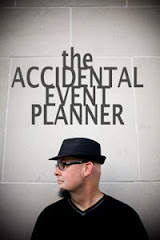MAN! I feel for whoever the RNC planners are! I'm sure they have had little sleep the last few nights as they've had to juggle the schedules of cantidates, politicians and Presidents - while attempting to have some sort of programming on the live floor for the convention attendees. AND - they planners have to make sure it all looks very smooth and intentional. The GREAT Event Planners are the ones who can roll with the changes and still make it a great event.
I learned an important lesson early in my corporate event planning career that I'd like to pass to you today.
Here it is - EXPECT SOMETHING TO GO WRONG! Now, stay with me or you may miss the point. I don't mean that you should work yourself into a tizzy that EVERYTHING will come crashing down that you've planned.
Rather - I had to learn how to plan an event that I could re-direct at a moment's notice if necessary.
I also had to figure out how to simplify my work and the way I did it so I could easily make changes.
My first few years as an event planner, I planned things that took a cast of thousands, and an army of volunteers to make it happen. I was producing some great stuff, but I was at the office ALL the time, ALL day, ALL night. It was killing me - and my home life. I realized that if I was going to make it as an event planner, I was going to have to simplify my plans and how I approached the work.
One of the first "tenants" of event planning that I adopted at the time was this: "Events are about people, and when you work with people, someone will get sick, someone will have a late flight, someone will cancel".
I learned to anticipate sicknesses and delays, even family deaths that would happen as I was juggling hundreds of conference speakers and volunteers. I learned to plan conferences / sessions that I could easily combine if I needed.
For example: I starting cutting the number of breakouts I held to maximize the seating in the rooms where they were held Instead of having say, 36 breakouts with 30-50 in the room, I cut back the choices to 18 breakouts with 100+ in the rooms. I also chose to hire better quality speakers that really brought their A-game, taught "hotter" topics, and enjoyed the energy of a packed room. (Be careful! I also made a few enemies from some of the lesser-quality folks that we used to hire every year!)
I also began to trim back in the way I did staging. Now hear me - I LOVE to build out a great big stage setup, but instead of building a bunch of wooden & foam core flats with overheads, rigging and other set props, I started to concentrate on 1 main focal point. To simplify - I began to use fabrics and uplight them. They go up and come down in minutes and always look good. For awhile I was on a parachute kick, using white or army green parachutes to drape the stage and lighting them in creative ways.
I think you get my drift by now. I still plan with big vision, but simplify the steps. I've found that as long as I hold to quality in my simplicity, that most of my attendees are quite happy. Those of you who are pro planners will kill yourselves if you keep trying to top the last thing you did.
One last thing - when it came to hiring speakers, conference leaders, musicians - wading through all their individual contracts was a big time-soaker for me and our legal dept. I came up with a standardized contract (with our legal dept.) that I used with most all of the folks I hired (with their permission). As long as I covered all the basics of their fees, travel & lodging, most of them were fine if I sent my contract to them. This was a BIG time-saver for me, as I could just fill-in the blanks for each person and send the contract to them.
I hope today's post encourages you to begin thinking how you can simplify how you work.
Share in the comments how you may have done this!
The AEP - Dave


No comments:
Post a Comment